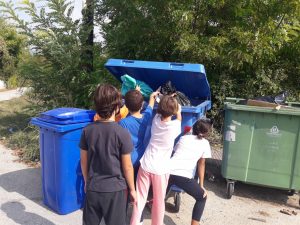A teaching innovation project furthers automation of three organic orchards at European schools
Agenda 2030, DOMOTIC, ERASMUS, erasmus pdi, ods, proyectos internacionales
13 February 2023
 Enhancing different skills in school children and promoting environmental and climate knowledge through the construction of an automated orchard is the objective of the new Domotic School Garden teaching project at the Miguel Hernández University of Elche, which is funded by the Erasmus+ program. UMH Associate Professor of Agronomic Engineering, Antonio Ruiz Canales, is coordinating this initiative, which has been applied at schools in Bulgaria, Greece, and Italy, and is part of the Strategic Associations in the Area of School Education KA201 initiative.
Enhancing different skills in school children and promoting environmental and climate knowledge through the construction of an automated orchard is the objective of the new Domotic School Garden teaching project at the Miguel Hernández University of Elche, which is funded by the Erasmus+ program. UMH Associate Professor of Agronomic Engineering, Antonio Ruiz Canales, is coordinating this initiative, which has been applied at schools in Bulgaria, Greece, and Italy, and is part of the Strategic Associations in the Area of School Education KA201 initiative.
In addition to the UMH, the Domotic School Garden is comprised of three European elementary schools. They are St. Kliment Ohridski, from Bulgaria; Circolo Didattico ‘Bufalini’ di San Giustino e Citerna, from Italy; and Mikro Evmoiro Xanthi, from Greece. The firm of La Llave Consulting S.L., is also participating.
This project aims for students to learn how natural systems function in a practical manner, such as school orchards, and how these affect surrounding ecosystems. These students are also learning the importance of climate in sustaining life on the planet.
The Domotic School Garden project develops automation of three organic school orchards at the same time that it fosters STEAM skills (science, technology, engineering, art, and math) in these students, in addition to English language skills. To date, the UMH has proposed 8 activities related to varied topics, such as biology, botany, organic agriculture, sustainability, and the 2030 Agenda of the United Nations. Examples of this are the creation of seed banks and insect hotels, studied fruits and vegetables as parts of healthy diets. A logo for the project has also been created, and some basic concepts on agricultural sensors and weather stations have been examined.
The participating schools work on different activities that have been adapted to their local environments, in accordance to proposals from the multidisciplinary group of researchers at the UMH. This group is comprised of researchers from the Agro-Food and Agro-Environmental Research and Innovation Center (CIAGRO) at the UMH, Antonio Ruiz Canales, María Teresa Pretel Pretel, and Amparo Melián Navarro, along with a teacher from El Palmeral high school in Orihuela, Spain.